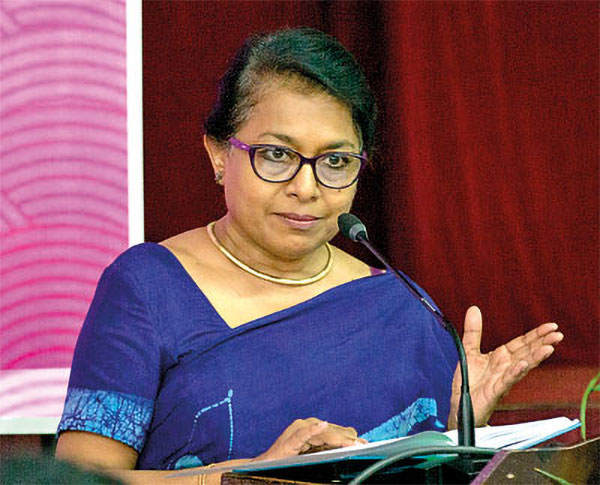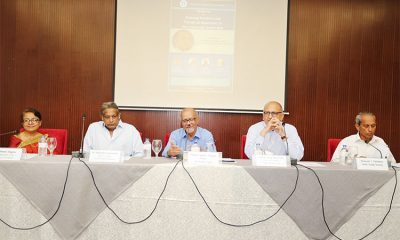News
Ex- HRC Chairman warns against allowing one man show in governance if country to remain a democracy

No country could be described as democratic if there is no separation of powers that ensures one branch of government does not exceed its powers, former head of the Human Rights Commission of Sri Lanka (HRCSL) Prof. Deepika Udagama said in a televised interview on Tuesday (28.)
“The three branches of government, i.e., the executive, the legislature, and the judiciary, must keep an eye on each other so that there is a balance. The 1978 Constitution centered power on the executive president. The question ever since has been how to put limits on the power of the executive president and to achieve balance between the three branches of government,” she said.
The establishment of the constitutional council in 2001 was an attempt to limit the power of the president, Prof. Udagama said. The Council is to ensure that the president does not make appointments to key positions on his own.
“The idea is that these key positions must be appointed through consensus,” she said.
President Ranil Wickremesinghe recently told parliament that the Council failed to approve his nominee to the Supreme Court and his continuing requests to reappoint the current IGP long after his age of retirement.
The president added that the lack of approval has resulted in the police not functioning and the courts coming to a standstill.
The President also announced his decision to appoint a Parliamentary Select Committee to probe delays by the Council.
“The 20th Amendment made the executive president extremely powerful. 21st was brought to amend this, and President Ranil Wickremesinghe played a role in passing the amendment. Almost everyone who becomes president, depending on his or her view of the executive president, brings an amendment to the constitution. They make the constitution in their image using the two-thirds majority,” she said.
The Constitutional Council was established first under the 17th Amendment under specific political circumstances, Prof. Udagama said. The executive presidency was held by Chandrika Bandaranaike Kumaratunga, who represented the Sri Lanka Freedom Party, while the parliamentary majority was held by the United National Party. Most parties agreed that the powers of the executive needed to be limited. The Mahinda Rajapaksa administration that followed undermined the 17th Amendment and, in 2010, abolished the 17th Amendment by passing the 18th Amendment.
“The 18th Amendment established the parliamentary council, which had no power. The Constitutional Council was brought back under the 19th Amendment during the yahapalana government. President Gotabaya Rajapaksa abolished it again with the 20th Amendment to the Constitution. The 21st Amendment was an acknowledgement that the president must not be given such unlimited powers,” she said.
The Constitution is the supreme law of the land, but successive presidents have remade the Constitution the way they want, she said. This is against the idea of democracy and what a constitution is, Prof. Udagama said.
“Maybe the next president will bring in the 22nd Amendment. This is not good. This is making light of the Constitution,” she said.
(RK)
News
US sports envoys to Lanka to champion youth development

The U.S. Embassy in Colombo welcomed the U.S. Sports Envoys to Sri Lanka, former National Basketball Association (NBA) and Women’s National Basketball Association (WNBA) players Stephen Howard and Astou Ndiaye, from June 8 through 14.
The Public Diplomacy section of the U.S. Embassy said that it would launch a weeklong basketball program intended to harness the unifying power of sports, made possible through collaboration with Foundation of Goodness and IImpact Hoop Lab.
While in Sri Lanka, Howard and Ndiaye, both retired professional basketball players, will conduct a weeklong program, Hoops for Hope: Bridging Borders through Basketball. The Sports Envoys will lead basketball clinics and exhibition matches and engage in leadership sessions in Colombo and Southern Province for youth aged 14-18 from Northern, Uva, Eastern and Western Provinces, offering skills and leadership training both on and off the court. The U.S. Envoys will also share their expertise with the Sri Lanka Basketball Federation, national coaches, and players, furthering the development of basketball in the country. Beyond the clinics, they will collaborate with Sri Lankan schoolchildren to take part in a community service project in the Colombo area.
“We are so proud to welcome Stephen and Astou as our Sports Envoys to Sri Lanka, to build on the strong people-to-people connections between the United States and Sri Lanka,” said U.S. Ambassador Julie Chung. “The lessons that will be shared by our Sports Envoys – communication, teamwork, resilience, inclusion, and conflict resolution – are essential for leadership development, community building, equality, and peace. The U.S. Sports Envoy program is a testament to our belief that sports can be a powerful tool in promoting peace and unity.”
News
Rahuman questions sudden cancellation of leave of CEB employees

SJB Colombo District MP Mujibur Rahuman in parliament demanded to know from the government the reasons for CEB suspending the leave of all its employees until further notice from Thursday.
MP Rahuman said that the CEB has got an acting General Manager anew and the latter yesterday morning issued a circular suspending leave of all CEB employees with immediate effect until further notice.
“We demand that Minister Kanchana Wijesekera should explain this to the House. This circular was issued while this debate on the new Electricity Amendment Bill was pending. There are many who oppose this Bill. The Minister must tell parliament the reason for the urge to cancel the leave of CEB employees,” the MP said.However, Speaker Mahinda Yapa Abeywardena prevented Minister Wijesekera responding to the query and said that the matter raised by MP Rahuman was not relevant.
News
CIPM successfully concludes 8th Annual Symposium

The Chartered Institute of Personnel Management (CIPM) successfully concluded the 8th Annual CIPM Symposium, which took place on 31st May 2024. Themed “Nurturing the Human Element—Redefining HRM in a Rapidly Changing World,” the symposium underscored the pivotal role of human resource management (HRM) in today’s dynamic global landscape. Since its inception in 1959, CIPM has been dedicated to advancing the HR profession through education, professional development, and advocacy, solidifying its position as Sri Lanka’s leading professional body for HRM.
Ken Vijayakumar, the President of the CIPM, graced the occasion as the chief guest. The symposium commenced with the welcome address by the Chairperson, Prof. Arosha Adikaram, followed by the Web Launch of the Symposium Proceedings and Abstract Book by the CIPM President. The event featured distinguished addresses, including a speech by Chief Guest Ken Vijayakumar, President of CIPM, and an address by Guest of Honor Shakthi Ranatunga, Chief Operating Officer of MAS Holdings Pvt. Ltd., Sri Lanka.
The symposium also featured an inspiring keynote address by Prof. Mario Fernando, Professor of Management and Director of the Centre for Cross Cultural Management (CCCM) at the University of Wollongong, Australia.
Vote of Thanks of the inauguration session was delivered by Dr. Dillanjani Weeratunga, Symposium Co-chair.
The symposium served as a comprehensive platform for researchers to present their findings across a wide range of critical topics in HRM. These included Cultural Diversity and Inclusion, Talent Development and Retention, Ethical Leadership and Corporate Social Responsibility, Adapting to Technological Advancements, Mental Health and Well-being at Work, Global Workforce Challenges, Employee Empowerment, and Reskilling and Upskilling.
The plenary session was led by Prof. Wasantha Rajapakse. Certificates were awarded to the best paper presenters during the valedictory session, followed by a vote of thanks delivered by Kamani Perera, Manager of Research and Development.
The annual symposium of CIPM was a truly inclusive event, attracting a diverse audience that spanned undergraduates, graduates, working professionals, research scholars and lecturers. This widespread interest highlights the symposium’s significance in the field of HRM, offering a unique opportunity for everyone to network and learn from scholarly brains.The CIPM International Research Symposium was sponsored by Hambantota International Port, Sri Lanka Institute of Information Technology (SLIIT), E B Creasy & Co. PLC, and Print Xcel Company.














